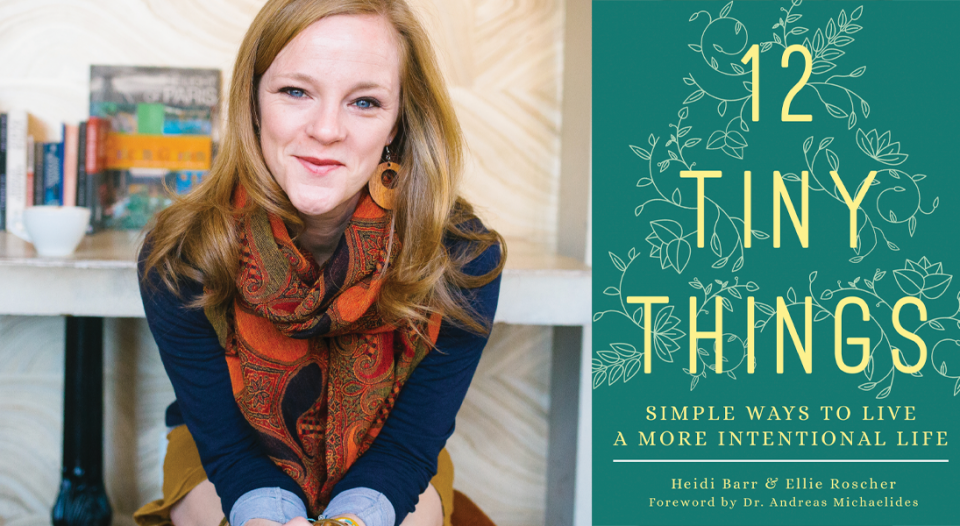“Tiny” is the wrong word for the vision of Ellie Roscher and Heidi Barr.
When Roscher and I speak, her energy exudes through the phone. We’ve met in person exactly twice, but she greets me like an old friend. She feels fully present in every moment of our conversation, delighted by every question and quickly expanding on ideas as they arise.
Roscher’s experience as a young adult minister and writing coach—cultivating space among a variety of ideas, drawing people in—is evident even in a one-on-one conversation. And there is nothing she’s more excited to cultivate space for and draw people into than the understated but significant undertaking of the approach behind the new book she wrote with Barr, 12 Tiny Things: Simple Ways to Live a More Intentional Life (Broadleaf Books, 2021).
In 2016, the authors were serving in separate communities—Roscher teaching theology at Bethlehem Lutheran Church Twin Cities and writing at the Loft Literary Center and Barr as a wellness coach. But they were hearing about the same experiences: people felt paralyzed and overwhelmed by the speed and antagonism of the national political process. “Life feels like it’s happening to me,” their students and clients reported. The world, in short, felt like too much, and any semblance of control or power over their own experience felt like too little.
Over time, comparing their experiences and the needs of their communities, Roscher and Barr developed a Facebook group called 12 Tiny Things. There, they challenged participants to focus on one essential part of their life—such as communication, home, creativity, community, work or food—for one month. Participants were invited to do one tiny thing to effect a positive change. When it seemed like the world was too big to manage, they instead offered a solution that was, as Roscher described it, “too small to fail.”
From three years of community development arose the book 12 Tiny Things, a guide for curating a spiritual practice that promotes a more reflective, rooted and intentional life.
Not strictly prescriptive
Roscher and Barr bring distinct energies and intentions to the work but share common backgrounds, expertly woven into their shared mission. Both are authors, and their wordsmithing craft offers the gentle steps of 12 Tiny Things as an invitation into deeper living rather than a self-righteous demand. Both are theologians with graduate degrees from Luther Seminary, St. Paul, Minn., and see clearly into the religious and spiritual hungers particularly plaguing the American psyche recently.
Both are trained in wellness and yoga, and they understand the importance of attending to the physicality of our spirituality. And both are Minnesotans who know what it means to be diligent and patient in growth, like many of us in the North who know we must wait out the cold before we can grow, bloom and bear fruit. Their shared and diverse gifts come together in an intentionally small but spiritually rich book.
But 12 Tiny Things is more than a book. The authors continue to cultivate a rich Facebook group—“a very light accountability group,” as Roscher described it—of over a thousand members, working through the book and its practices, reflecting on each other’s journeys and sharing experiences.
Participants were invited to do one tiny thing to effect a positive change.
On the 12 Tiny Things website, Roscher and Barr develop and offer free resources for further engaging with the concepts. Some are concrete, such as liturgical calendars with suggestions for each day: “smell your food before you taste it”; “touch something in nature”; “sit down when you eat.”
But 12 Tiny Things is not strictly prescriptive. It includes group studies, spoken meditations and many other resources for accompanying individuals and communities in their discernment of what “tiny thing” might deepen their experiences of “space” or “learning” or “sensuality.” Wisely, Roscher and Barr have set up a system in which those who need guidance or specific suggestions can find them, while those who a have a sense of what needs to change and only require the push to do it can find the support to do so.
12 Tiny Things is not, explicitly, a religious book. There is no direct mention of Jesus, no concrete evangelism, no promotion of finding the nearest Lutheran congregation to further one’s spiritual practice. But the book, and the community and resources around it, are so deeply spiritual and intentional that the parallels to our religious life are unmistakable.
In my ministry, I used a breathing meditation from 12tinythings.com in our weekly Holden Evening Prayer service (via Facebook), connecting it to God’s restoration of the children of Israel in Ezekiel 37. Two days later, a church matriarch called me. “I really liked that thing we heard during Holden,” she said. “Sometimes I wake up and I can’t fall back asleep. But I tried the breathing counting that she did, and it worked!”





